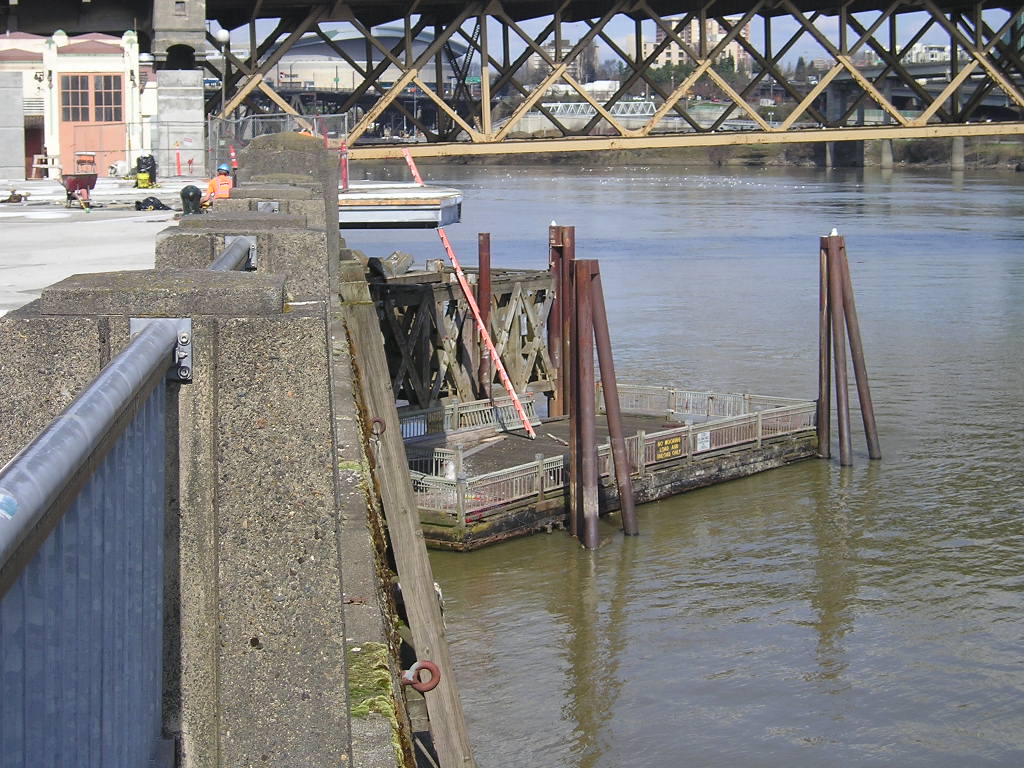
By Michael Munk
Contributing Columnist
The impending relocation of Portland’s Saturday market includes a new pedestrian walk cantilevered just over the Willamette River south of the Burnside Bridge. But will its strollers be aware they are passing over the only public memorial to a labor leader in the state of Oregon?
Since it was dedicated by International Longshore and Warehouse Union (ILWU) leader Harry Bridges in 1979, the Francis J. Murnane Wharf has stood (and floated) at the seawall at the foot of SW Ankeny Street. It commemorates Murnane’s career as an organizer of the former CIO International Woodworkers of America (IWA) in the 1930s and after 1946 as a longshoreman and president of Portland ILWU Local 8. He died in 1968 while chairing a meeting of its members at a time when he had also become a prominent leader of the historic preservation movement in the city.
Bridges noted that Murnane’s IWA and ILWU were both founded “in the spirit of the old Industrial Workers of the World” and that “it was always his hope that the slogan of the Wobblies (and Karl Marx) would come true: ‘Workers of the World Unite.’” Father Bertram Griffin of St. Andrews Catholic Church followed Bridges to bless the wharf for the use of “radicals, labor activists, and lovers.”
During the McCarthy Era, Murnane was an outspoken defender of persecuted radicals. He organized the Julia Eaton Ruuttila Defense Committee in 1948 -- and more than 30 years later Ruuttila reported the Wharf dedication in the union paper, The Dispatcher. As chair of Portland’s Harry Bridges Defense Committee in 1949, Murnane denounced the Portland police Red Squad for targeting the ILWU leader. He ran for the state legislature on the Progressive Party ticket in 1948.
The Murnane Wharf included a floating dock, viewing piers and access stairs at whose head was a bronze plaque containing the ILWU emblem, pictures of Murnane and a ship similar to the ones he worked on as a slingman. It stated: Here at the site of Portland’s first commercial dock, the citizens of Portland, Oregon, have dedicated this area of the Waterfront Park in memory of Francis J. Murnane, many times president of ILWU Local 8, in recognition of his years of service to the “men along the shore” whose labor, sweat and skill have helped make our city one of the great ports of the world. His concern encompassed the city, its fountains, parks, statues and its history. He was known by the City Fathers of his time as the “cultural and historical conscience of Portland.”
As Portlanders wait to see whether Murnane’s memory will remain honored at the Wharf, they should recall the struggle to honor him in the first place. City leaders promised at his death in 1968 that a portion of Waterfront Park, then being designed, would be named for him. But that promise was forgotten until eleven years later when, after extensive efforts of the ILWU Columbia River District Council, City Commissioner Mildred Schwab and especially Jesse Stranahan of ILWU Ship Clerks Local 40, forced official action.
By 1989, the memorial plaque had been stolen and the Portland Development Commission, remembering its reference to Murnane as the “cultural and historical conscience of Portland,’’ put up $500 to replace it. The plaque was again removed for the current construction and has not yet been replaced.
In his later years, Murnane was best known as a champion of historical preservation. Recalling his efforts to save a deteriorating fountain in Washington Park, a blogger recently lamented that, “There are no rabble-rousing art-loving longshoremen left” to save local artifacts. And even those to whom Murnane’s politics were dangerously radical could appreciate that side of him. Newspaper editor Donald Sterling, who cheered the firing of radicals during the McCarthy era, could look back in 1992 and “ Bless the memory … of Francis J. Murnane, a longshoreman and self-appointed protector of historic landmarks. He gave a new meaning to sound and fury when he was in full cry before the Portland City Council in defense of the Benson drinking fountains or the purity of public restrooms.”
Last summer, I spoke with Mayor Potter about my hope that the Murnane Wharf would be restored after the Saturday Market construction was completed. Like most Portlanders, Potter was not aware of the wharf and its unique place in the city’s labor history. But he expressed his interest and concern and assigned a staff member to assure it would resume its honored place on the waterfront. So now it’s once again up to the labor movement and the public to make sure the former mayor’s intent is carried out.
Michael Munk is an author and a former professor of political science. He is the author of The Portland Red Guide, a guide to Portland’s radical past.
